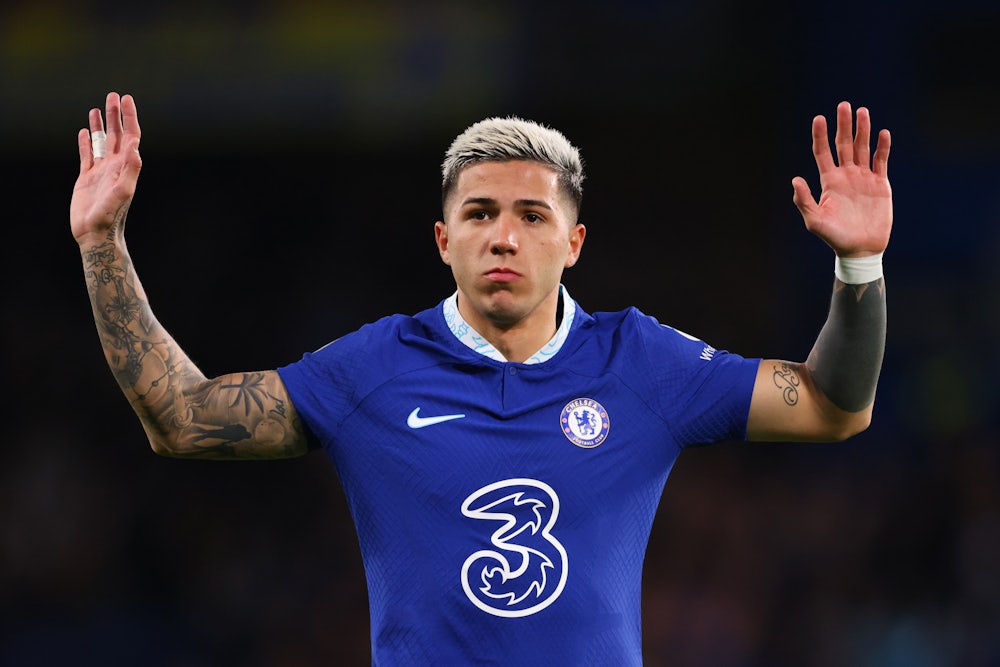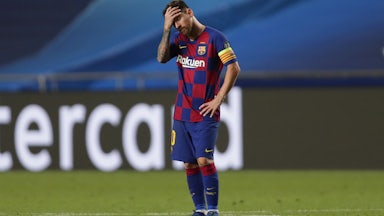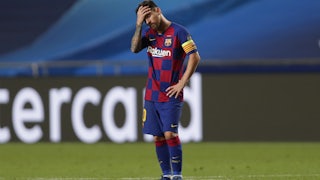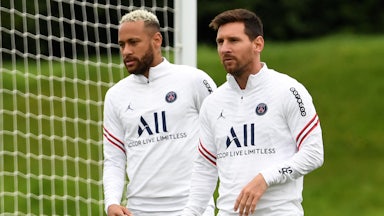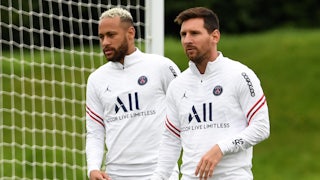When American businessman Todd Boehly purchased Chelsea Football Club from Roman Abramovich last spring, the conventional wisdom was that the bacchanalia of spending that had defined the Russian oligarch’s time running the team had come to an end. For nearly two decades, Abramovich had spent lavishly, almost drunkenly—splashing previously unheard-of fees to build a super team that would, in short order, become one of European soccer’s dynamos. His teams were chaotic, messy, and ultimately very successful: Five Premier League titles and two Champions League trophies came to West London during the Abramovich era.
All of that success cost a yacht-load of cash, but Abramovich didn’t mind spending—and losing—a lot of ducats along the way. For one thing, owning Chelsea was a better and more exclusive status symbol than owning almost anything else. For another, the team was a valuable part of Abramovich’s buddy Vladimir Putin’s strategy of engagement with the West—Abramovich would use his connections to the high-flying world of European soccer to, among other things, help bring the World Cup to Russia in 2018. Those ties to Putin ultimately cost Abramovich his beloved club—he was forced to sell Chelsea shortly after Russia invaded Ukraine last February.
Enter Todd Boehly. Under Abramovich, Chelsea rarely made a profit; the club had lost nearly $1 billion over the course of his two decades in charge and had been reliant on vast personal loans to function. Surely this could not continue; the team’s new American owner would have no choice but to tighten its belt and find ways to run it more efficiently and profitably. Abramovich’s Chelsea regularly dropped more than $100 million on players a transfer window; Boehly’s would likely have to do with less. Surely you couldn’t run a club like this without deep connections to a nation-state’s cash reserves.
Boehly’s Chelsea has gotten off to a disappointing start—it currently sits tenth in the Premier League table, vastly underperforming expectations. But it has not been run differently: The Boehly era has been as turbulent and messy as the one that preceded it; arguably more so. There have been no fire sales. There is no age of austerity. Instead, Boehly has embarked on the largest spending spree in sports history, dropping more than $600 million on players in the last two transfer windows. Over the last month alone, he spent more than $80 million on a pacy Ukrainian winger who’s never played for a club team outside his home country’s domestic league and $120 million on a gifted Argentinian midfielder who had played fewer than 50 senior games.
Boehly’s spending is crazy. But there is a logic to it, and it is the logic of a European soccer ecosystem that is dangerously imbalanced. Two years ago, soccer fans across the continent and England gathered to protest the creation of a new “Super League” that would enrich the world’s most prominent clubs at the expense of everyone else. The outpouring of rage from fans seemed to be sufficient to force Europe’s footballing plutocrats to put the kibosh on their scheme. Now, however, that system has arrived all the same—just in the form of the English Premier League itself, whose economic power dwarfs that of its neighbors. (For comparison, Chelsea alone spent more than $300 million on players in the January transfer window—roughly 10 times the amount spent by every team in Spain’s La Liga, until recently the world’s most prominent league.) The result is a global system that is profoundly unequal—and perilous for the health of the sport.
Chelsea’s wild spending has understandably dominated discussion of the January transfer window, but the English Premier League’s dominance is best understood by looking at the bottom of the table, rather than the top. Nottingham Forest, currently at thirteenth in the table but perched dangerously close to the relegation zone, raked in another trove of players, including Paris St. Germain’s Keylor Navas, who had started in goal in a Champions League final less than five years earlier. Bournemouth, currently sitting in eighteenth with a 66 percent likelihood of being relegated, per FiveThirtyEight, were able to outbid A.C. Milan—one of Italy’s biggest and Europe’s most prestigious clubs—for A.S. Roma forward Nicolo Zaniolo.
The Italian winger didn’t end up traveling to southern England, but that hardly matters. A Premier League team in England’s relegation zone can now outbid one of Europe’s giants. The Deloitte Money League, which ranks the financial power of European soccer, more or less concurs: 11 of its 20 most valuable clubs are English. Milan sits slightly behind West Ham United (currently sitting in sixteenth in the EPL) and slightly ahead of Leicester City (fourteenth) , Leeds (fifteenth), and Everton (nineteenth).
In fairness, these geographic power shifts occur frequently. Italy dominated the late 1990s and early 2000s. Spain was the world’s biggest league when it fielded soccer’s two biggest stars, Cristiano Ronaldo and Lionel Messi, for most of the 2010s. England’s reign as Europe’s unquestioned leader has been relatively brief. But there are several reasons to believe that the Premier League’s ascension to the highest echelon will be far more dangerous for the overall health of global soccer.
A large part of the premiership’s ability to separate itself from its peers rests with the pandemic. England was able to pull away in large part because it made advantageous and strategic broadcasting deals earlier than its competitors. When the pandemic hit, other leagues were ravaged; the Premier League took a hit but was able to emerge more or less unscathed. Now Italian soccer is in shambles while La Liga remains profoundly top-heavy, thanks in part to the imbalanced international broadcasting deals that had dominated it until recently.
The Premier League’s orgy of spending follows the logic of a gambler. There is so much money in the Premier League that teams are desperate to stay in it—hence the spending sprees embarked on by Nottingham Forest and Bournemouth. Staying up can mean a difference of hundreds of millions of dollars; once relegated to the lower division, there’s no guarantee that you’ll be back up anytime soon. Huddersfield Town F.C. was relegated in 2019; last year, they came close to promotion, losing in the second division’s playoffs to Forest; currently, they sit near the bottom of the table and are poised to be relegated to England’s third division.
But this is a dangerous game. Teams spend wildly to try to stay up; once they go down, they have inflated budgets and see a sudden decline in revenue. This can lead to what Mike Goodman and Michael Caley have dubbed the “Sunderland vortex”: a situation in which a once-dominant team overspends and suddenly finds itself in a tailspin. (Sunderland, after years in purgatory, are currently young, fun, and on the rise; Everton, one of the Premier League’s founding clubs, appear to be in the midst of the vortex.)
For a team like Chelsea, the logic is only slightly less risky. England is currently Europe’s most competitive league, but it will send only four teams to the Champions League—currently seven are in competition, though that is being slightly charitable to both Chelsea and Liverpool, who made the final last year but currently sit in seventh. Being in the Champions League alone is worth millions; winning it, as Chelsea did in 2020, brings in more than $100 million. This allows teams to spend more—the financial laws governing world soccer are easy to stretch, as Chelsea has, but they do technically exist—which subsequently gives them a better chance to stay in the Champions League and continue the moneymaking cycle.
Some have attempted to defend the English Premier League’s financial dominance in trickle-down, Thatcherian terms. A rising tide lifts all boats: The EPL may be raiding the continent, but those teams who are selling will be able to reinvest their money next summer. This is an appealing take on events, but it’s a fantasy. The English Premier League is raking in the world’s best players and, in particular, its best young talent; there’s no reason to believe this will ever balance out. Most of Europe’s traditional elite are a mess right now. Barcelona may be first in La Liga, but they are chaotically managed and deeply in debt; Juventus is under multiple criminal inquiries and was just docked 15 points in Serie A for fraud. Both Milan teams are struggling, as is Real Madrid. England’s head start in terms of international broadcasting revenue is an incredible advantage; these teams have yet to recover from the global pandemic. The situation in the near future is poised to get worse, not better.
This all gives rise to a number of imbalances. Right now, the Premier League is, essentially, the de facto European Super League, one in which a relative minnow such as Bournemouth—a team whose stadium seats just 11,000—is suddenly fielding players who, a few years ago, would have been playing in the Champions League on the rosters of the top continental clubs. This is, in some ways, exciting—if you’re a Bournemouth fan. (It is actually exciting if you like one of England’s smaller teams who are actually good, like Brentford.) But it’s hardly competitive. The risks of financial immolation are great. Chelsea will probably never get relegated to the second division, but spending $600 million on players in a year carries long-term risks, regardless of the clever accounting tricks that are used.
The normality of the spending is also troubling. The widespread consensus surrounding the team that I support, Liverpool, is that they have done far too little, that the owners have abandoned the club, and that—generally speaking—everything is totally fucked. This perspective on the matter is warped: Liverpool, as ESPN’s Ryan O’Hanlon pointed out earlier this week, had the sixth-highest net spend in the world. The expectation among fans is that teams splash money around constantly; anything less is met by open rebellion.
Liverpool have, in recent years, been a model for financial prudence and efficiency: Cleverly selling players and reinvesting wisely helped build an entertaining club that competed for titles. That may be impossible now. There is simply too much money sloshing around for a smart and sober approach to building a squad to have a chance of succeeding: Two of the Premier League’s best teams, Manchester City and Newcastle United, are literally owned by petro-states. The very involvement of Premier League teams in player negotiations, meanwhile, is tripling or even quadrupling player fees, shutting out everyone but England’s elite from the world’s best young players.
It’s easy to imagine a situation in which everything breaks and stays broken. England’s worst teams are financially devastated from overspending when they’re relegated. Its best teams are debt-ridden as they desperately try to outcompete each other. The rest of Europe remains a shambles, unable to recover from the pandemic and years of raiding by English teams. And there is no reason to believe that this vicious cycle will stop spinning any time soon. The goings-on during the transfer window are now as momentous as the actual competition of the Champions League. There are journalists, most notably Fabrizio Romano and David Ornstein, whose whole job revolves around the money being tossed about, the wheeler-dealing, the eye-poppingly inflated fees, and the top English clubs race to determine the most profligate spender among them. This is soccer now. What happens on the field is important. But the money swirling around off the pitch—that’s where the real action is.
